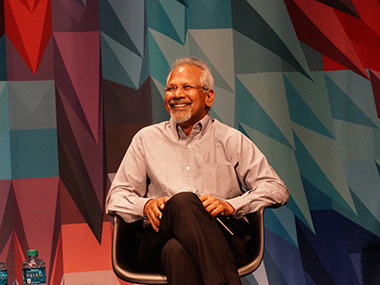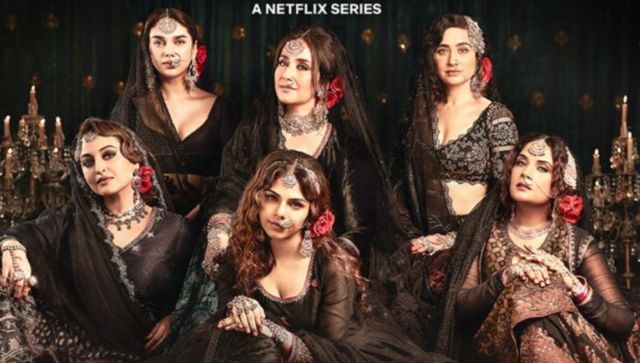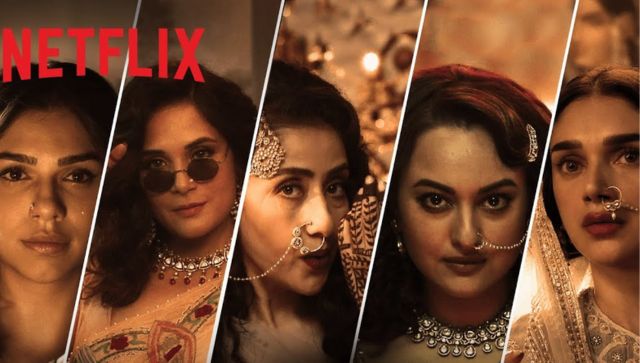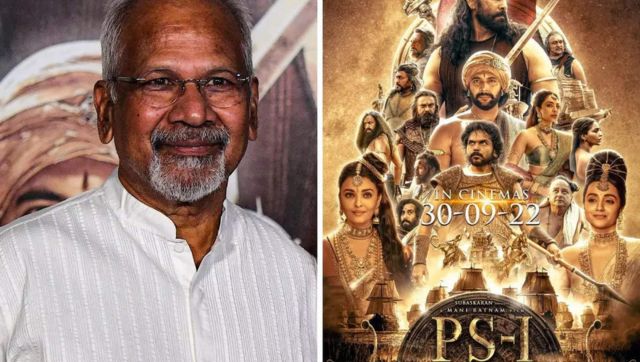Amid peals of laughter, green tea and general banter, a few questions find answers.
It is a sun-soaked afternoon in Mani Ratnam’s classy office. The Madras Talkies team is abuzz as the ace filmmaker’s current film Kaatru Veliyidai gears up for release on 7 April.
“We just finished the film today, so I am relatively relaxed,” says Mani Ratnam. He had sent me a small note ahead of the interview saying he was running late by ten minutes. From the minute he entered at 4:45 pm, till he took me to his room — in his two-floor, airy office filled with sunshine and lots of greenery — the team had different decisions for him to take a call on.
Mani Ratnam is the personification of calm even on a war-footing. “See me, when I’m shooting”, he retorts, laughing. As I open my red notebook to take my notes, Mani Ratnam’s gaze becomes all attentive. He is not in any hurry and the hot afternoon in Chennai changes temperature to become super-cool, much like ‘Mani sir’ himself.
Here’s a peek into the mind of the master filmmaker in this Firstpost exclusive.
This is your 34th year at the movies; 15th film with A R Rahman, and 25 years since Roja. Do you feel overwhelmed by these numbers, this track record?
No (smiles) I’m not overwhelmed by numbers. There have been directors before me, like K Balachander who have done a 100 movies, If I’m able to achieve even 25% of what directors before me have done, it would be nice.
For the audience however you’re the one setting benchmarks even now. What would the Mani Ratnam, who rode a scooter and took his scripts to many producers/actors in 1982/83, say to you now?
(Laughs heartily) The scooter was PC’s (cinematographer P C Sreeram), I had a bike then. Well, earlier one could work without any expectation or fear. I started off fearless! It is like the freedom you experience when you ride a bike. There are no hesitations for you then. Now, however, you carry a lot more weight – you’ve to stray from what you’ve done before with every film. You’ve got to be aware of the things expected of you and you can’t repeat your mistakes (pauses). Progress can’t be without fulfilling the promises you made to yourself before.
So have you kept your promise(s) to the director who started out with no prior work-experience and did an off-beat Kannada film in 1983? Who took four films and three years to reach the recognition and success ‘Mouna Raagam’ brought in 1986?
Every film is a promise made to my earlier self (laughs). This is the least I can do with each film and hope I can improve on it the next time I make a film.
Interesting you use the word least here…
Ha ha ha! If the film I do is the best, then I should quit right?
The word Kannamaa is understood after one reads or says Kaatru Veliyidai…
(Finishes the sentence) Yes, it is from Bharathi’s duet ‘Kaatru Veliyidai Kannamma …’
…and this title is your first from the freedom-fighter and poet Bharathiyar’s works. From titles to story ideas, do they find you or do you find them?
Nothing finds you (laughs heartily) you’ve got to go seeking them.
You strike on a few ideas, get stuck, get out of it, then restart or start with a fresh concept, flesh it out and hope someday you will be able to complete it. The idea or concept, which you can describe in a few sentences, is the key. What do you want to make a film about? What are you so passionate about in such high measure that you can wake up to it every single day without loss of excitement?
The idea has to be worth the time you invest in it and you’ve got to be true to it. It should become integral to your life; it should keep you fascinated throughout the time you take to make it into a film. Whether the concept is a fictional story or based on an issue, it should entertain you first and it should be something you feel you can say as a film.
So what is the idea of KV? How new is it from your other love stories? The trailer shows the hero (Karthi being handsome as ever) with character-shades which seem new to an otherwise Mani Ratnam romantic hero. Aditi Rao Hydari’s Dr Leela actually says she can’t handle his outbursts bordering on abuse even. The relationship feels different from OK Kanmani. Since you have redefined romance for us with each film, how do you see ‘Love in the time of Mani Ratnam’?
More than new is it true? Is the love true? Is he real? Is she real? The answer is yes. The lead pair’s journey forms the film. KV portrays the relationship between two well-defined characters.
The teasers, trailers and posters all tell you what to expect from the film, it gives you a glimpse of what’s there. It is an in-depth travel into a relationship, its ups and downs. How deep is the bond? Do they stick or un-stick? (Laughs pleased at his coinage) As for love, it’s not like I go seeking to explore ‘a’ particular aspect of love which I haven’t done before. Whatever is out there, whatever is true that can lend itself to a film — whether it was OK Kanmani, which in all senses is a ‘today’s’ film or KV, which is treated as a classical drama — the honesty in narrating each particular love story is what matters.
KV is about vast spaces against which two individuals are juxtaposed. It is not an intimate setting like OK Kanmani. It is wide, not compact. The story traverses over an air-force officer and a doctor’s lives, their geographies, their many years together, their distances, and just how strong their love is. I don’t believe there is any ‘right’ or ‘wrong’ in a relationship and that’s how some people’s lives are in reality.
This story will connect because it is about two people whose lives have a lot more drama than what we see normally.
The music of KV is very telling and since we are celebrating the 25th year of your association with A R Rahman, can you tell us how a composing session with Rahman normally pans out?
(Muses) With Rahman, it’s difficult to describe because every time we sit to compose for a film, it’s always different from the previous time.
But let me try – well, after the basic idea for the film is discussed, Rahman will sit on his keyboard with his headphones on while I sit quietly and wait on. He will press a few keys and play a few notes and then at some point, he will walk away from the keyboard and will ask you to listen to what he’s just created.
I give him an idea, I don’t know what he does while composing (smiles fondly) but he gives me a tune in the end (laughs).
I should say I’ve evolved with him. We don’t necessarily compose for any particular situation from the film. The theme develops and we both jam, we get through speed-breakers if any and sometimes even cross paths. Creating music with Rahman is like working on a complete music album. It’s a collaborative effort definitely. Both of us are not driven by trite situations and believe the songs have to take the story forward.
When you say you ‘jam’, can you sing?
I can’t sing at all (laughs) I’m a listener and I guess I can pick out a good tune (smiles); not studying music formally has its advantages. Once the songs are developed you fit it in as you write.
I don’t change scenes drastically just because I’ve heard a song from the film but sometimes Rahman’s songs are so good that it can supersede your scene. Then you get greedy (laughs) and you want to lap it all up and keep everything in the film.
I’ve been very lucky that way, both with Ilayaraja and with Rahman. Their working styles and music is obviously different but both of them have contributed to my writing and my films in a big way.
When you see your films do you go “damn, wish I’d done that differently” or do you go “wow”?
Damn is easier (laughs out loud) ‘damnnn…’ will come very fast. The wow hardly comes. Seriously, I can’t watch any of my films after it’s over. I don’t even try that hard to hold on. I just snap out of the whole attachment I’ve had with the film on the day it’s over – like today. Now the film is like a baby - all alive and kicking and one needs to just make it presentable enough for you to see.
Your films and interactions with you have always given me the following adjectives to describe you – Pertinent, relevant and updated. How do you view this ability to stay relevant as a filmmaker whose movies cut across generations? Does age matter?
Age? What is age? Who has aged? (Laughs aloud)
With time, one may not see a lot of freedom to say what you wish to say in a film, but, hey, I didn’t jump jobs to quit being a director ever. I wanted to become a filmmaker and here I am. I better be relevant to the times we live in and I’m glad I still have a few more films left in me.
The agony and the exhilaration of creating a film excites me. I’m happiest when I’m making a film. You see, after my first film I thought I will be a cat at film-making but sadly no (laughs), it didn’t happen that way. Film-making is like playing golf (Mani Ratnam is an avid golfer) — both demand a lot out of you. Both are just that much out of reach all the time and you have to strive hard to score.
I don’t believe a film is in your head; it is not so for me. No movie has ever run in my head ahead of shooting it (Laughs more). I feel like a sculptor, who has an illusion of his creation in his head. There has to be a sketch, dimensions drawn out and then, the sculptor starts chipping away, constantly. It’s all abstract till you reach the end point, but you’ve to go on chiseling. The best thing about art is that nothing is perfect.
Oh to me there is — your visuals. Nobody shoots a film like the way you do.
(Takes the compliment like a pro) See, I began with Balu Mahendra, Ramachandra Babu and moved on with PC Sreeram, Santosh Sivan, Ravi K Chandran right up to Ravi Verman now, so how can I go wrong ever? (Emphasises) Be it the camera department or production design, costumes, sound and editing — where I had Lenin, Suresh Urs and now Sreekar Prasad — these are the best in their trade, so how can I possibly fail?
I see to it that I surround myself with the best in the business. It’s an inspired team on every film, and they walk that extra mile with me. It’s not like the film or what you see as a frame is just my vision. What you see is what we as a team have discovered together.
You’re a man of few words, a ‘shy, introvert’. Did you ever think you got into a people-management job as a director, given cinema is all team-work?
No. After all these years, I’m still the same guy I was when I began (laughs). I’m not pre-defined by any expectation from the job of a director. I think I communicate very well, I feel that’s what I’m paid (laughs) and for trying to get all departments as excited as I am about the film we have on hand. Yes, somewhere I think I am good at this (smiles shyly) but then, as I said earlier, I also choose good people to co-create my product.
What’s up next from you after Kaatru Veliyidai?
Well, there are as always many seeds/ideas floating (smiles) it has to lend itself to become a full-fledged script. I’ve not locked any idea right now. I’m hoping to look for a few more concepts; I will let them be with me for while, incubate them (laughs) and then decide.


)




)
)
)
)
)
)
)
)